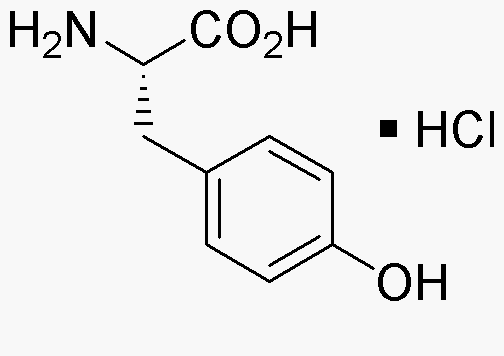L-Tyrosine hydrochloride is widely utilized in research focused on:
- Neuroscience: It serves as a precursor for neurotransmitters like dopamine, norepinephrine, and epinephrine, making it valuable in studies related to mood, stress, and cognitive function.
- Nutrition: Commonly used as a dietary supplement, it supports mental performance and may help improve focus and alertness, particularly during stressful situations.
- Pharmaceuticals: Employed in the formulation of medications aimed at treating conditions such as depression and attention deficit hyperactivity disorder (ADHD), enhancing the efficacy of treatments.
- Sports Science: Utilized by athletes for its potential to enhance physical performance and recovery by reducing fatigue and improving exercise capacity.
- Cosmetics: Incorporated in skincare products for its antioxidant properties, helping to protect skin cells and promote overall skin health.
General Information
Properties
Safety and Regulations
Applications
L-Tyrosine hydrochloride is widely utilized in research focused on:
- Neuroscience: It serves as a precursor for neurotransmitters like dopamine, norepinephrine, and epinephrine, making it valuable in studies related to mood, stress, and cognitive function.
- Nutrition: Commonly used as a dietary supplement, it supports mental performance and may help improve focus and alertness, particularly during stressful situations.
- Pharmaceuticals: Employed in the formulation of medications aimed at treating conditions such as depression and attention deficit hyperactivity disorder (ADHD), enhancing the efficacy of treatments.
- Sports Science: Utilized by athletes for its potential to enhance physical performance and recovery by reducing fatigue and improving exercise capacity.
- Cosmetics: Incorporated in skincare products for its antioxidant properties, helping to protect skin cells and promote overall skin health.
Documents
Safety Data Sheets (SDS)
The SDS provides comprehensive safety information on handling, storage, and disposal of the product.
Product Specification (PS)
The PS provides a comprehensive breakdown of the product’s properties, including chemical composition, physical state, purity, and storage requirements. It also details acceptable quality ranges and the product's intended applications.
Certificates of Analysis (COA)
Search for Certificates of Analysis (COA) by entering the products Lot Number. Lot and Batch Numbers can be found on a product’s label following the words ‘Lot’ or ‘Batch’.
*Catalog Number
*Lot Number
Certificates Of Origin (COO)
This COO confirms the country where the product was manufactured, and also details the materials and components used in it and whether it is derived from natural, synthetic, or other specific sources. This certificate may be required for customs, trade, and regulatory compliance.
*Catalog Number
*Lot Number
Safety Data Sheets (SDS)
The SDS provides comprehensive safety information on handling, storage, and disposal of the product.
DownloadProduct Specification (PS)
The PS provides a comprehensive breakdown of the product’s properties, including chemical composition, physical state, purity, and storage requirements. It also details acceptable quality ranges and the product's intended applications.
DownloadCertificates of Analysis (COA)
Search for Certificates of Analysis (COA) by entering the products Lot Number. Lot and Batch Numbers can be found on a product’s label following the words ‘Lot’ or ‘Batch’.
*Catalog Number
*Lot Number
Certificates Of Origin (COO)
This COO confirms the country where the product was manufactured, and also details the materials and components used in it and whether it is derived from natural, synthetic, or other specific sources. This certificate may be required for customs, trade, and regulatory compliance.


